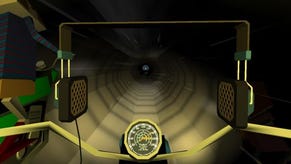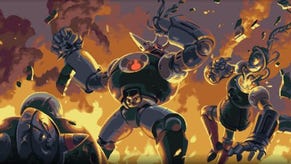RPS Advent Calendar, Dec 19th: Duskers
Drone warfare
The next door on the Advent Calendar might be dangerous...or, to be more precise, what's behind it might be. We haven't examined the contents yet and would advise that you do not approach it until it's been fully scanned. Why not send in a drone to open the door while you hide in the bedroom. That way if anything terrible emerges, you'll be safe, hiding under the duvet.
It's the game with 2016's best interface, Duskers!
Brendan: Duskers makes me want to sing, but very quietly. The kind of hushed singing you do to yourself when there’s nobody around and you’re extremely nervous. On the face of it, each level is straightforward. You just have some robots, an unexplored spaceship, and your command prompt. That so much atmosphere can be created with so little is impressive. That it recreates the feeling of being a forgotten and lonely employee of Weyland Yutani is even more so. It’s the best Alien game that isn’t really an Alien game.
Part of this is down to the enemies, which you only really see as part of a distorted sonar, shortly before one of your most valued drones is torn to shreds. At first, they are terrifying. Vent-creeping xenothings, clouds of vicious nanites. You don’t want to open any door, explore any room, in case a bullish extraterrestrial storms towards you the moment you enter. But slowly, you learn how to cope, coaxing the aliens through the corridors and rooms like a shepherd with a motion detector, flushing them out whatever airlock you can find or manipulating turrets to fire on them. Confidence comes. You get parts, you get new drones, you get fuel. Maybe this time you will discover the meaning behind this abandoned, ruined galaxy. After all, you can afford to be careful, you have time on your side.
And then you meet the real enemy.
Alec: We’re giving this Best User Interface, right? There’s a certain type of typing which, nowadays, we only see in 70s and early 80s sci-fi. Retro, yes, but futuristic too - something that seems so purely utilitarian, keyboards and screens designed to withstand the rigours of space travel. And something which acts as barrier between the human and the unknown.
Duskers is all about that barrier - the exactness of typing in commands, but the distance involved in relaying those commands to a remote, mindless drone, the awful sense of delay and limitation in the responses you receive. Something is out there, but you can’t see it - you can only try to predict where it might be. The laborious clunk of initial typing gradually gives way to the rapid clatter of memorised shortcuts, and something a little more like reflex slowly becomes possible.
But throughout, that beautiful sci-fi horror trope, evoked so well from tone rather than scene: the door to another room is opening. What awful thing might await beyond? By the time you find out, it will already be too late.
Graham: I ended up not enjoying the strategy game I was most looking forward to in 2016: XCOM 2. Where Enemy Unknown had felt like a distillation of everything I liked about X-COM, XCOM 2 seemed overburdened with stuff. Stuff which cluttered up the world map and drowned you with decisions that didn't matter or you didn't understand, and which made the tactical battles longer and their normal inconsistencies much more frustrating.
Duskers isn't turn-based, but it offers many of the same tensions and excitements of XCOM in a package that is small, tight, never wasteful. Soldiers become droids, though you still name them; you still creep across levels in search of enemies you can't initially see; you still find tech and drag it back home with you, jetting off when finished or fleeing when the going gets tough. Its tactical and strategic layers are both slight but they feed into one another, and what it lacks in depth it makes up for with atmosphere, with the mystery that compels you forward. Duskers isn't my favourite game of the year but I think it would have been in most other years than 2016.
Adam: STUFF IS GREAT, GRAHAM.
Duskers is great too. It reminds me of two of my favourite games: Uplink and Alien: Isolation. The Uplink connection should be obvious to anyone who played both games; it’s the interface. You’re typing in real life and you’re typing in the games. You are your own avatar. That, for me, is the perfect way to play, more convincing than any VR claw and goggle set.
Of course, not every game would suit this kind of interface. Duskers sci-fi horror is the perfect fit though, giving you indirect control, and distancing you from the claustrophobic hulls and hells you explore, without letting you ever feel truly safe. Importantly, all of the tech that you control feels authentic, which is why the Alien comparison comes to mind. Future-retro anxiety at its best.










